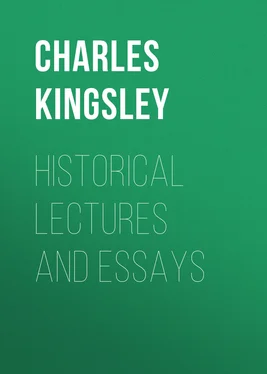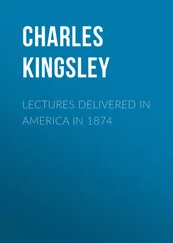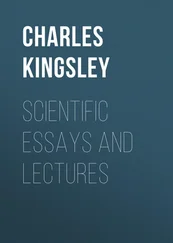Charles Kingsley - Historical Lectures and Essays
Здесь есть возможность читать онлайн «Charles Kingsley - Historical Lectures and Essays» — ознакомительный отрывок электронной книги совершенно бесплатно, а после прочтения отрывка купить полную версию. В некоторых случаях можно слушать аудио, скачать через торрент в формате fb2 и присутствует краткое содержание. Жанр: foreign_prose, История, foreign_edu, foreign_antique, на английском языке. Описание произведения, (предисловие) а так же отзывы посетителей доступны на портале библиотеки ЛибКат.
- Название:Historical Lectures and Essays
- Автор:
- Жанр:
- Год:неизвестен
- ISBN:нет данных
- Рейтинг книги:5 / 5. Голосов: 1
-
Избранное:Добавить в избранное
- Отзывы:
-
Ваша оценка:
- 100
- 1
- 2
- 3
- 4
- 5
Historical Lectures and Essays: краткое содержание, описание и аннотация
Предлагаем к чтению аннотацию, описание, краткое содержание или предисловие (зависит от того, что написал сам автор книги «Historical Lectures and Essays»). Если вы не нашли необходимую информацию о книге — напишите в комментариях, мы постараемся отыскать её.
Historical Lectures and Essays — читать онлайн ознакомительный отрывок
Ниже представлен текст книги, разбитый по страницам. Система сохранения места последней прочитанной страницы, позволяет с удобством читать онлайн бесплатно книгу «Historical Lectures and Essays», без необходимости каждый раз заново искать на чём Вы остановились. Поставьте закладку, и сможете в любой момент перейти на страницу, на которой закончили чтение.
Интервал:
Закладка:
And so they were converted to what was then a dark and awful creed; a creed of ascetic self-torture and purgatorial fires for those who escape the still more dreadful, because endless, doom of the rest of the human race. But, because it was a sad creed, it suited better, men who had, when conscience re-awakened in them, but too good reason to be sad; and the minsters and cloisters which sprang up over the whole of Northern Europe, and even beyond it, along the dreary western shores of Greenland itself, are the symbols of a splendid repentance for their own sins and for the sins of their forefathers.
Gudruna herself, of whom I spoke just now, one of those old Norse heroines who helped to discover America, though a historic personage, is a symbolic one likewise, and the pattern of a whole class. She too, after many journeys to Iceland, Greenland, and Winland, goes on a pilgrimage to Rome, to get, I presume, absolution from the Pope himself for all the sins of her strange, rich, stormy, wayward life.
Have you not read—many of you surely have—La Motte Fouqué’s romance of “Sintram?” It embodies all that I would say. It is the spiritual drama of that early Middle Age; very sad, morbid if you will, but true to fact. The Lady Verena ought not, perhaps, to desert her husband, and shut herself up in a cloister. But so she would have done in those old days. And who shall judge her harshly for so doing? When the brutality of the man seems past all cure, who shall blame the woman if she glides away into some atmosphere of peace and purity, to pray for him whom neither warnings nor caresses will amend? It is a sad book, “Sintram.” And yet not too sad. For they were a sad people, those old Norse forefathers of ours. Their Christianity was sad; their minsters sad; there are few sadder, though few grander, buildings than a Norman church.
And yet, perhaps, their Christianity did not make them sad. It was but the other and the healthier side of that sadness which they had as heathens. Read which you will of the old sagas—heathen or half-Christian—the Eyrbiggia, Viga Glum, Burnt Niall, Grettir the Strong, and, above all, Snorri Sturluson’s “Heimskringla” itself—and you will see at once how sad they are. There is, in the old sagas, none of that enjoyment of life which shines out everywhere in Greek poetry, even through its deepest tragedies. Not in complacency with Nature’s beauty, but in the fierce struggle with her wrath, does the Norseman feel pleasure. Nature to him was not, as in Mr. Longfellow’s exquisite poem, 3 3 On the Fiftieth Birthday of Agassiz.
the kind old nurse, to take him on her knee and whisper to him, ever anew, the story without an end. She was a weird witch-wife, mother of storm demons and frost giants, who must be fought with steadily, warily, wearily, over dreary heaths and snow-capped fells, and rugged nesses and tossing sounds, and away into the boundless sea—or who could live?—till he got hardened in the fight into ruthlessness of need and greed. The poor strip of flat strath, ploughed and re-ploughed again in the short summer days, would yield no more; or wet harvests spoiled the crops, or heavy snows starved the cattle. And so the Norseman launched his ships when the lands were sown in spring, and went forth to pillage or to trade, as luck would have, to summerted, as he himself called it; and came back, if he ever came, in autumn to the women to help at harvest-time, with blood upon his hand. But had he stayed at home, blood would have been there still. Three out of four of them had been mixed up in some man-slaying, or had some blood-feud to avenge among their own kin.
The whole of Scandinavia, Denmark, Sweden, Norway, Orkney, and the rest, remind me ever of that terrible picture of the great Norse painter, Tiddeman, in which two splendid youths, lashed together, in true Norse duel fashion by the waist, are hewing each other to death with the short axe, about some hot words over their ale. The loss of life, and that of the most gallant of the young, in those days must have been enormous. If the vitality of the race had not been even more enormous, they must have destroyed each other, as the Red Indians have done, off the face of the earth. They lived these Norsemen, not to live—they lived to die. For what cared they? Death—what was death to them? what it was to the Jomsburger Viking, who, when led out to execution, said to the headsman: “Die! with all pleasure. We used to question in Jomsburg whether a man felt when his head was off? Now I shall know; but if I do, take care, for I shall smite thee with my knife. And meanwhile, spoil not this long hair of mine; it is so beautiful.”
But, oh! what waste! What might not these men have done if they had sought peace, not war; if they had learned a few centuries sooner to do justly, and love mercy, and walk humbly with their God?
And yet one loves them, blood-stained as they are. Your own poets, men brought up under circumstances, under ideas the most opposite to theirs, love them, and cannot help it. And why? It is not merely for their bold daring, it is not merely for their stern endurance; nor again that they had in them that shift and thrift, those steady and common-sense business habits, which made their noblest men not ashamed to go on voyages of merchandise. Nor is it, again, that grim humour—humour as of the modern Scotch—which so often flashes out into an actual jest, but more usually underlies unspoken all their deeds. Is it not rather that these men are our forefathers? that their blood runs in the veins of perhaps three men out of four in any general assembly, whether in America or in Britain? Startling as the assertion may be, I believe it to be strictly true.
Be that as it may, I cannot read the stories of your western men, the writings of Bret Harte, or Colonel John Hay, for instance, without feeling at every turn that there are the old Norse alive again, beyond the very ocean which they first crossed, 850 years ago.
Let me try to prove my point, and end with a story, as I began with one.
It is just thirty years before the Norman conquest of England, the evening of the battle of Sticklestead. St. Olaf’s corpse is still lying unburied on the hillside. The reforming and Christian king has fallen in the attempt to force Christianity and despotism on the Conservative and half-heathen party—the free bonders or yeoman-farmers of Norway. Thormod, his poet—the man, as his name means, of thunder mood—who has been standing in the ranks, at last has an arrow in his left side. He breaks off the shaft, and thus sore wounded goes up, when all is lost, to a farm where is a great barn full of wounded. One Kimbe comes, a man out of the opposite or bonder part. “There is great howling and screaming in there,” he says. “King Olaf’s men fought bravely enough: but it is a shame brisk young lads cannot bear their wounds. On what side wert thou in the fight?” “On the best side,” says the beaten Thormod. Kimbe sees that Thormod has a good bracelet on his arm. “Thou art surely a king’s man. Give me thy gold ring and I will hide thee, ere the bonders kill thee.”
Thormod said, “Take it, if thou canst get it. I have lost that which is worth more;” and he stretched out his left hand, and Kimbe tried to take it. But Thormod, swinging his sword, cut off his hand; and it is said Kimbe behaved no better over his wound than those he had been blaming.
Then Thormod went into the barn; and after he had sung his song there in praise of his dead king, he went into an inner room, where was a fire, and water warming, and a handsome girl binding up men’s wounds. And he sat down by the door; and one said to him, “Why art thou so dead pale? Why dost thou not call for the leech?” Then sung Thormod:
“I am not blooming; and the fair
And slender maiden loves to care
For blooming youths. Few care for me,
With Fenri’s gold meal I can’t fee;”
Интервал:
Закладка:
Похожие книги на «Historical Lectures and Essays»
Представляем Вашему вниманию похожие книги на «Historical Lectures and Essays» списком для выбора. Мы отобрали схожую по названию и смыслу литературу в надежде предоставить читателям больше вариантов отыскать новые, интересные, ещё непрочитанные произведения.
Обсуждение, отзывы о книге «Historical Lectures and Essays» и просто собственные мнения читателей. Оставьте ваши комментарии, напишите, что Вы думаете о произведении, его смысле или главных героях. Укажите что конкретно понравилось, а что нет, и почему Вы так считаете.












